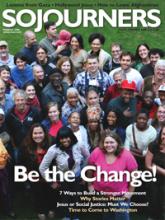Lately, I’ve been wrestling with forgiveness. I suspect that we all reach this point at some stage in our adult spiritual journey. Once we are old enough to start making “adult mistakes,” we inevitably wrangle with the flip side: offering and asking for adult forgiveness. It’s not easy.
The dictionary defines forgiveness as “ceasing to feel resentment against an offender.” I decided to ask elder-prophet-pastor Mary Cosby, who co-founded Washington, D.C.’s Church of the Saviour in 1947, if, at age 86, forgiveness gets any easier.
“Learning how to forgive should get easier the older you get,” she said, “and I think it does. The older I get the more important it is to do things as an act of the will and let the feelings come later. Forgiveness is something that takes time for most people. They can make the first acts immediately, but to really internalize forgiveness takes time. The first act, for me, is just the will—just to say ‘I forgive.’ I don’t feel it, but I am committed to it.”
Robert D. Enright’s book Forgiveness is a Choice outlines four steps in the forgiveness process: uncovering our anger, deciding to forgive, working on forgiveness, and discovering release from our emotional prison.
In my experience, the church has failed most profoundly in teaching us about step one: uncovering our anger. Actually, I think the church has taught—especially to women—elaborate and sanctified ways to cover, mask, and bury our anger, denying us access to the power of transformation and forgiveness.
Read the Full Article
